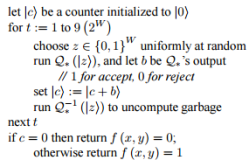Fresh from ETH Zurich comes the new Silq programming language. They also have submitted a paper to the PLDI 2020 conference on why they feel that it is the best quantum programming language so far. Although it may be not common knowledge, the lack of usable general purpose quantum computers has not kept multiple teams from developing programming languages for such computer systems.
Microsoft’s Q# is a strong contender in this space, along with the older QCL language. The claims by the Silq team on exactly why their language is better appear to come down to it being ‘more high level’, and by supporting automatic (and safe) uncomputation. While the ‘high level’ aspect is suspect since Q# is most decidedly a high-level programming language, their uncomputation claim does at least have some merit.

Uncomputation is a concept in quantum programming, where one occasionally has to remove a few intermediate objects from the current state because they may cause quantum interference that would affect the resulting output. Normally, one would save the intermediate result to a register for this, then reset the state and continue. Which parts of the state to keep and what to uncompute is however not easily determined, as a quick glance at related answers over at the Quantum Computing StackExchange and Theoretical Computer Science might reveal.
The main question thus appears the validity of this claim about Silq being able to automatically determine what ‘garbage’ can be safely uncomputed, and what should be part of the quantum interference. We have all seen with languages like Java and C# how even with traditional computing something as simple as garbage collecting can go horribly wrong. Maybe we shouldn’t count our quantum chickens yet until this particular waveform has fully collapsed.
(Thanks to Qes)
















Quantum puns… Now I can laugh and simultaneously roll my eyes and moan.
And the winner award for most awkward word if the year goes to: uncompute
This feels like a dreadful return of early programming languages.
It does, and that’s not a bad thing.
The earliest languages were viable but not very good, and actually using them taught us what changes would be useful. Languages evolved slowly and every once and a while one would do something novel that caught on.
In the Air Force, there were certain initiation exercises that took advantage of the noobs’ lack of experience; people new to the service simply didn’t have enough experience to know when their legs were being pulled. The traditions including sending new trainees out to procure items such as a gallon of prop wash, a hundred feet of flight line, or a matched pair of fallopian tubes.
So now I find myself in the position where I may actually have to take a basic course in quantum computing, just to avoid similar pitfalls.
this is for sure, but what if all this quantum nonsense will never took off? just like in the 60s where they thought the flying car will be the future, just imagine if one guy opened up his house for easy landing :)
He ended up bragging to his friends about his atrium.
The first two are great gags, but the last one would be embarrassing for anyone over the age of twelve not to know.
Now yes, in the 60s, the first time a lot of people found out was when the doc was explaining how you got your girlfriend pregnant.
I was taken for w/ the last one when I was in the Navy but it wasn’t because I didn’t know what Fallopian tube was but because I thought it was a nickname for the actual thing. I went to the mech shop who sent to the structures shop who sent me to the electrical shop and that’s when I go, “wait a second. what does a tube have to do w/ electrical stuff?”
An electrician in the US Air Force told me about that kind of thing going wrong, once.
The typical trick in an AF electrician shop was to send a trainee to go get an “amp trap” to catch all the excess current after a fuse blew.
That was great fun until one of the trainees (who was an electrician before joining the Air Force) actually went out and got an “AmpTrap” fuse – that is an actual brand name. (https://www.amazon.com/Gould-Shawmut-A4J400-Amptrap-Class/dp/B00J2H7D16)
The “trainee” went and got an AmpTrap, and ended that “joke” permanently.
Apparently restaurants send people for a “bag of steam” and I always wondered why nobody brings a bag with water and dry ice in it. Whoever asked for it would be so surprised, it’s like the perfect reverse prank!
Just make sure you get a good quality niobium shovel for digging quantum wells and you’ll be fine.
QC and machine learning scare me a bit… I wonder if there’s still going to be any jobs I can keep up with in 30 years, or if it’s all going to be stuff that actually needs an understanding of math?
Seriously? No, of course not. But it’s okay – nobody will have to work any more.
So, an uncomputing process returns cycles back to the CPU, heat back into electricity, and electricity back to the power plant. Got it.
Okay, I give up. Where is the “idiot’s guide”?????? I went to the page on hackaday.io purporting to be a class on quantum computing, where I was assaulted by cartoons (because cartoons make everything easy) using jargon and notation that is meaningless to me. USELESS. Somewhere, there must be a bridge from “never heard of quantum computing” to “how to do basic things that take advantage of quantum computing.
Although I knew the meanings of all of those things, and that they were nonsense designed to make a fool of me, I’m quite sure I wasn’t taught any of them in high school.